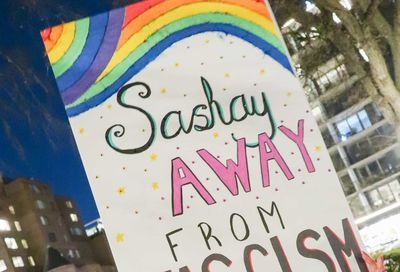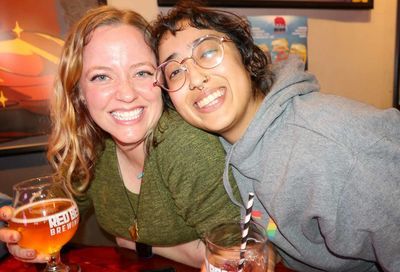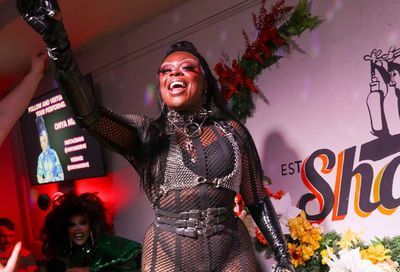The setting was nearly divine, as marriage-equality activists gathered in a hall of All Souls Church, Unitarian, in Columbia Heights. The sky turned to twilight through the tall, arched windows and drawings by children from Hiroshima, Japan, “Finding Hope in War’s Aftermath,” lined the walls. It was a setting that saw speakers struggling, unsuccessfully, to avoid war metaphors while discussing marriage equality in the District.
That evening, Wednesday, May 13, the church’s Rev. Robert Hardies welcomed the speakers and audience to his church, imploring that D.C.’s marriage-equality debate not devolve into what he saw happening in California in November, where Proposition 8 was characterized by some as a struggle between secular people and those of faith, black against white.
“As a gay person, and a person of faith, when I saw what happened with marriage equality last fall, I was pained,” he told the crowd of about 50 people. “Let’s not let this go down the same way in D.C.”
Rev. Monique Ellison, one of three panelists, spoke shortly after Hardies, herself pained by Councilmember Marion Barry’s (D-Ward 8) warning that marriage equality in the District could spark a civil war.
“There’s no need for a ‘civil war’ in the District, or anywhere else,” she said. “People of faith have to speak up. That’s why I’m here: to encourage people of faith to speak up.”
Ellison was joined by Michael Crawford, a founder of DC for Marriage, a marriage-equality program of The DC Center, the city’s GLBT community center; and Sharon McGowan, a staff attorney of the ACLU LGBT Project; with Sean Bugg, co-publisher of Metro Weekly, moderating.
Through two hours of discussion, which included several well-known faces from the GLBT community, such as Carlene Cheatam, Rick Rosendall of the Gay and Lesbian Activists Alliance, Paquita Wiggins of the Maryland Stonewall Democrats, The DC Center’s David Mariner, and Jeffrey Richardson of the Gertrude Stein Democratic Club, some points were repeated: that more gay African Americans should be open about their sexual orientation, that there must be a place for non-gay allies in the push for marriage equality, and that solidarity with other oppressed groups would go far in winning those allies.
Crawford didn’t pull punches during the discussion, saying that while the questions were relevant — how can the discussion be taken directly to the congregants of homophobic D.C. churches, for example — he and others are still trying to figure out the answers. There was no question, however, about the need for more GLBT African Americans to be out. Explaining that although he came out when he was 16, largely ending his relationship with his father, he is still defending a perception among people he doesn’t know that he is the “black, token face of the white gay movement.”
As he carries that burden, he insisted that more black, gay people come out.
“We have to ask them to come out. We have to,” he said. “We can’t coddle them. Â… We really have to get them to come out.”
Ellison took a somewhat gentler approach, in answering Wiggins’ question about what people could do, short of coming out: “At least speak up when LGBT people are being vilified. Avoid nodding and smiling when there’s hate speech going on.”
While the strategy of advancing marriage-equality in the District was not fine-tuned by the end of the evening, McGowan offered an optimistic note, referring to the arguments being used by those on the right to denounce marriage equality.
“The hysteria of the other side reflects that they know we’re going to win,” she said. “It’s just a matter of time.”
While no legislation has been introduced to allow District marriages to be of spouses of the same sex, the city recently passed legislation to recognize such marriages from other jurisdictions. That measure is undergoing its congressional oversight period. Meanwhile, a coalition of homophobic religious groups has begun rallying against marriage equality in the District, with Barry, a longtime ally of the gay community, joining that side. His Ward 8 Democrats, however, voted May 16 to support a resolution offered by longtime activist Philip Pannell in favor of marriage equality in the District.
For more information about DC for Marriage, visit www.thedccenter.org/programs_dcformarriage.html.


















